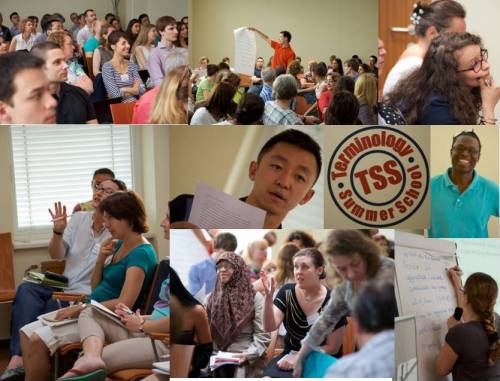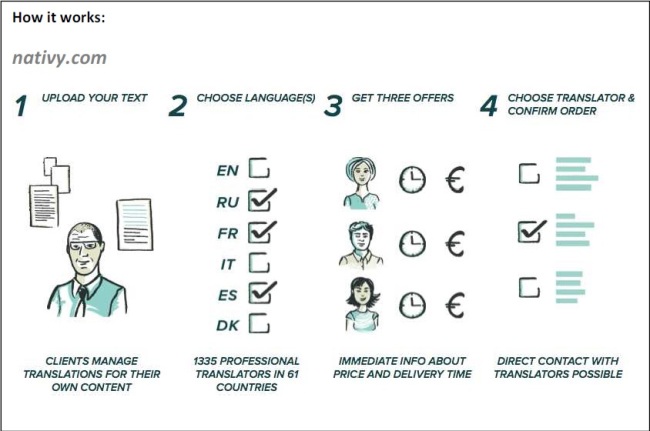-> strongly supported by TermNet, the International Network for Terminology
by Anja Drame

Roughly a week ago Gilbert Probst – economics professor and manager at the World Economic Forum (WEF), in other words a man who would know – addressed the audience who had assembled at the well-attended CIUTI Forum in Geneva. He was talking about a topic that was obviously close to his heart: Partnerships & Collaboration.
Since this is also an important topic for us at TermNet, ourselves an International Association with the aim to foster and facilitate such collaboration in the language industry sector for now 25 years, we listened attentively.
The mere fact that a person like him only a few days before kick-off of “his” World Economic Forum (and all the other high-ranking speakers – there were plenty!) were speaking at a “language event” demonstrates the special standing CIUTI enjoys, but this is another story and I am shifting off my story.
His talk reminded me that language industry is not so different after all from other sectors when it comes to dealing with the new global challenges. And that we can perhaps learn a thing or two from the World Economic Forum that is currently underway in Davos.
So, Probst was talking about benefits and difficulties we all face during this time of change with its insecurities, old values no longer valid and new challenges ahead which nobody can grasp yet in their full magnitude. And he was talking about a remedy that attentive followers of the WEF talks and discussions (yes, they were broadcast online :-)) also heard of repeatedly.
He urged the participants of that morning session to broaden their approach, to skip the
idea of going the way alone, to embrace partnerships.
Still too many of us fear collaboration because in their mind it is all about competition, about secrecy, and about demonstrating just how strong one person or organization can be without help or support.
But these are not qualities that are likely to get you through this long cold winter that
is also called economic crisis.
Collaboration and partnerships are all about synergies, of making use of strengths and
resources of the other for mutual benefit (the stress being on the word mutual!).
Partnerships can be formed not only within one’s own circle of peers. Moreover, they can –
and should even – reach across sectors.
Public-private partnerships are not new in business and governments. And the ever more important (Corporate) Social Responsibility (CSR) is built upon collaboration between the various stakeholders from all area of society.
Partnerships open one’s mind and show new ways. They also create resilience – another
buzzword one heard all along the recent meetings in Davos. So what does it mean? Resilience is the ability to survive as a system even if parts of the system are in distress. It is more or less like a human being in this season: Even if constantly attacked by vicious
flu virus and other bacteria from those runny-nosed around you, you stand a good chance not to fall ill if your overall immune system is intact. You are resiliant. Yeah, congrats, you have the chance to survive this winter.
And this is exactly what collaboration helps to build in an industry.
However, partnerships and collaboration are not an easy task. Whoever says so has never
really dealt with one. The more diverse the partners, the more different the respective
outlook on life, and the more each partner’s interests differ, the more of a challenge this
partnership becomes.
And this is where we can build the link back to our playground of terminology, multilingualism, diversity management and communication: In our globalised world, societal multilingualism becomes more complex than ever before.
Not only become our societies more and more multilingual, the combination is constantly
shifting. This makes it abit more difficult to find solutions that are meant forever.
Even in a monolingual setting (but even more so in a multilingual one), changes in
political and economic systems cause a new situation that needs to addressed.
For instance: the health system. As another great speaker at the CIUTI Forum in Geneva, Louis Loutan, argued, there are massive changes ahead in the way access to health and health systems work. Family, peers, social networks and more and more community health workers will reform the face of health systems forever (in case you wonder: this was also discussed at the WEF, among others by Jeffrey Sachs and Rwandan president Paul Kagame who kick-started a programme of 1 million additional health workers for Africa).
Doctors will lose increasingly their status as singular authority on health issues. People
will find their information online, through mobile devises, in social groups. Multiple
authorities on health questions will pop up. Therefore, education on health issues, (multilingual and multi-medial) content on health matters including new priorities for normal citizens is the new keyword.
By the way, Louis Loutan has co-authored guidelines for the dealing of health workers with interpreters which outlines some problems encountered here. It is available online free of charge if you are interested in this topic. And I find it quite aptly named “Other words, other meanings” as it demonstrates a good understanding of the subject. A very good read and highly recommended.
And it does not stop at the challenges posed in a linguistically diverse society. Diversity as such is prone to misunderstanding. Age, gender, different life experience, physical abilities, etc. all make sure one needs the little bit of extra care to ensure communication is successful.
For us terminology and language professionals all this opens up a vast new field of possibilities. But one that can not be taken upon all alone. We need partnerships. We need trust in one another. We need to start listening to others and find synergies. They exist. And there are more people willing to collaborate that you might think.
And this way we will not only survive, but prosper.
If you want to know more about this topic or how TermNet can support you, send me a message to termnet(at)termnet.org. I am looking forward to hearing from you!




